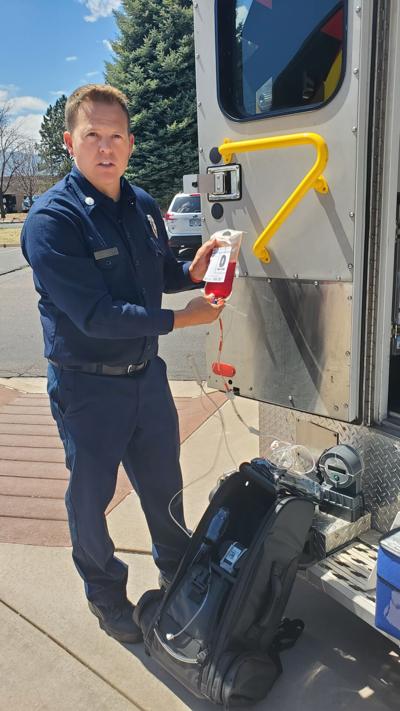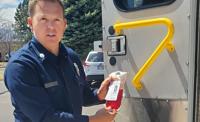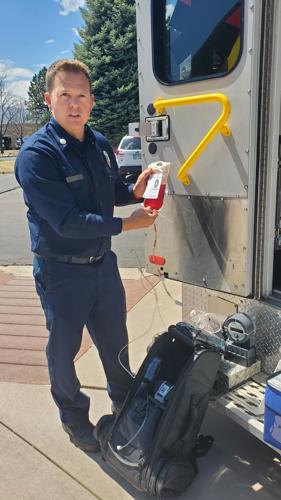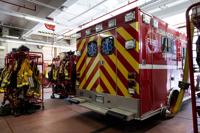Patients who have suffered a traumatic injury can soon begin receiving blood transfusions from Colorado Springs Fire Department paramedics before they ever reach the hospital, part of a new program fire officials and medical professionals estimate could improve survival rates by more than 40% in people who are hemorrhaging.
In Colorado Springs, about one trauma victim bleeds to death every 48 hours before emergency crews can get them to a hospital and into surgery, Fire Chief Randy Royal said Friday in front of Fire Department headquarters, alongside other fire and UCHealth officials.
The department's new whole blood program "is the bridge between those patients dying in the field and living and making it through emergency surgery," he said.
Through a partnership with UCHealth, paramedics with the Colorado Springs Fire Department will begin carrying whole blood — blood that has none of its components like red blood cells and plasma separated or removed — so they can administer blood transfusions to patients who are hemorrhaging before they get to a trauma center.
Lt. Joey Buttenweiser with #ColoradoSprings Fire Department holds up blood warming devices the department will use to transfer whole blood (blood containing red blood cells and plasma) to patients before they get to the hospital. @csgazette @CSFDPIO pic.twitter.com/Wq6MM1eFcK
— Breeanna Jent (@breejentnews) April 19, 2024
The department expects to roll out the program in May. Colorado Springs will be the first in Colorado to launch a whole blood program in a metropolitan area, officials said.
It's a relatively new, and major, shift in how first responders render emergency care in the field.
A joint news release from the Fire Department and UCHealth states first responders have traditionally used IV fluids to treat patients until they can transport them to a hospital.
Whole blood gives them a much better chance at survival, said Dr. Matt Angelidis, co-chief medical director of the Colorado Springs Fire Department and an emergency medicine physician at UCHealth.
While the practice of administering safe prehospital whole blood transfusions is relatively new among emergency medical systems nationwide, its practice for substantial blood loss was first used in military battlefields, dating back to World War I, he said by phone Friday.
Angelidis, who served in combat in Iraq, received his emergency medical training in the military. He saw firsthand battlefield medicine, including the use of whole blood transfusions, he said.
"I've always thought, 'If this works so well for the military, it would have to work in the civilian world,'" Angelidis said. "I've sat in after-action reviews with firefighters who are tearful and asking, 'Dr. Angelidis, what could we have done to save this person's life?' And we know if we had blood available and had transfused this patient, they'd be alive. So a big part of this project is empowering firefighters to save lives."
Other cities like New Orleans, Pittsburgh and San Antonio have implemented successful whole blood transfusion programs through their ground fire and EMS services, he said. In March 2022, Angelidis traveled to San Antonio for three days and learned how that city implemented their program, then brought those lessons back to Colorado Springs.
Colorado Springs firefighters will soon begin carrying whole blood, which they will receive from UCHealth Memorial Hospital's blood bank team, and transfusion equipment on two medical lieutenant supervisory rigs, fire and UCHealth officials said.
Royal and Fire Department Lt. Joey Buttenweiser said they believe the program will grow in their department over time, and hope other fire departments throughout the Pikes Peak region eventually join in, too, to save even more lives.
The program requires high-tech equipment that allows medical lieutenant paramedics to properly store, transport, reheat and transfuse blood. UCHealth and fire officials have a goal to raise $350,000 to support the program over its first three years, UCHealth spokeswoman Cary Vogrin said.
With more than $250,000 in donations to UCHealth Memorial Hospital Foundation from the Colorado Springs community, the Fire Department purchased specialized coolers and warming equipment for the program.
The donations will also support the program through its first three years, including blood and training, the news release states.









 Your Privacy Choices
Your Privacy Choices